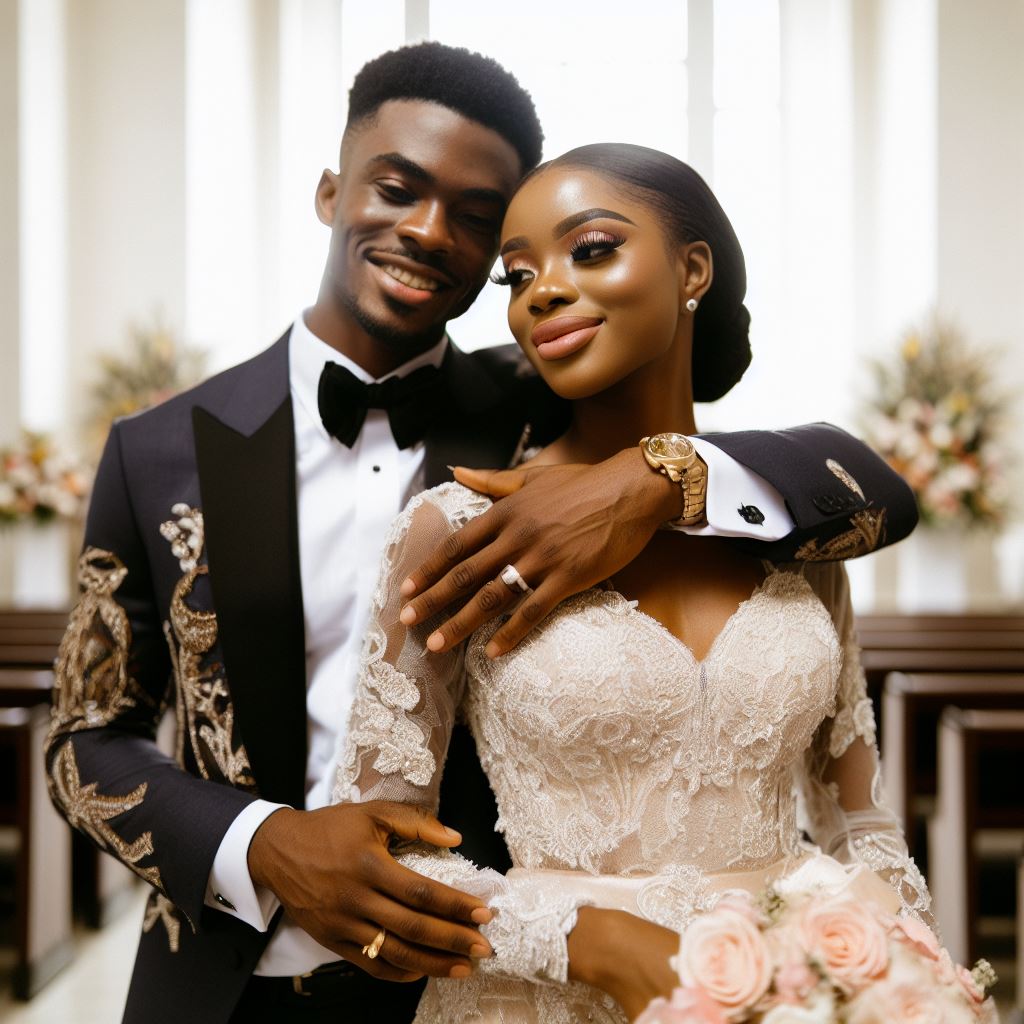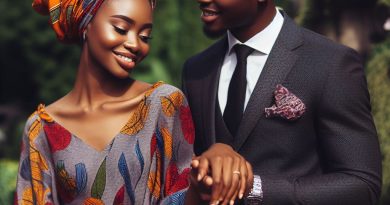Intricacies of the Nigerian White Wedding Ceremony
Last Updated on January 29, 2024
Introduction
A. Overview of the Nigerian White Wedding Ceremony
The Nigerian white wedding ceremony, a fusion of cultural and modern elements, symbolizes the union of two individuals.
B. Importance and Significance in Nigerian Culture
This ceremony holds immense cultural and social significance. It’s a celebration filled with tradition, love, and festivity, representing the couple’s commitment.
C. Thesis Statement
This blog post will explore the intricate details and cultural richness of Nigerian white weddings.
We’ll delve into the ceremonial customs, attire, rituals, and the underlying significance, offering a comprehensive understanding of this cherished celebration.
Pre-wedding Preparation
A. Engagement and Traditional Wedding Ceremonies
- The Nigerian white wedding ceremony is preceded by the engagement and traditional wedding ceremonies.
- The engagement ceremony involves the formal announcement and acceptance of the couple’s intention to get married.
- In the traditional wedding ceremony, the bride and groom pay homage to their respective families and ancestral spirits.
- This ceremony incorporates cultural customs, dances, music, and exchange of gifts and dowries.
- Both the engagement and traditional wedding ceremonies hold great significance in Nigerian culture.
B. Attire for the Bride and Groom
- The bride’s attire for the Nigerian white wedding ceremony often includes a white wedding gown.
- Traditional Nigerian bridal outfits such as the Yoruba iro and buba or the Igbo George are also popular.
- The groom usually wears a traditional Nigerian outfit, such as an agbada or a buba and sokoto.
- Contemporary grooms may opt for a western-style tuxedo or suit.
- Both the bride and groom put considerable effort into choosing their wedding outfits.
C. Selection of Wedding Date and Venue
- The selection of the wedding date and venue is a crucial part of the pre-wedding preparation.
- Nigerians consider the cultural and religious significance of the date in their decision-making process.
- Weddings are often held on weekends to accommodate guests and minimize work-related inconveniences.
- Venues are chosen based on factors such as accessibility, capacity, and overall ambiance.
- Nigerian couples aspire to select a date and venue that reflect their personal preferences and cultural traditions.
D. Invitation Cards and Guest List
- Invitation cards play a vital role in Nigerian white wedding ceremonies.
- Couples meticulously design and distribute invitation cards to their desired guests.
- The guest list typically includes family members, friends, colleagues, and influential figures.
- It is essential to ensure that the guest list covers representatives from both the bride and groom’s sides.
- Nigerian couples aim to create a diverse and inclusive guest list to celebrate their special day.
Read: Nigerian Engagement Lists: What To Expect and Prepare
Ceremonial Traditions and Rituals
A. Bridal shower and bachelor’s party
- The Nigerian white wedding ceremony typically begins with separate pre-wedding gatherings for the bride and groom.
- The bride enjoys a bridal shower, organized by the maid of honor or female friends.
- Games, gift exchanges, and female bonding activities are common during the bridal shower. Meanwhile, the groom celebrates his bachelor’s party with his male friends.
- It is a chance for the groom to have fun, unwind, and bid farewell to his bachelorhood.
B. Wedding procession and entrance
- The grand entrance of the bride and groom is a highly anticipated moment during the Nigerian white wedding.
- The groom, accompanied by his groomsmen, enters the venue before the bride’s arrival.
- The bridesmaids, flower girls, and page boys follow the groom’s procession.
- Finally, the bride takes center stage as she makes her stunning entrance, often escorted by her father.
C. Exchange of rings and vows
- The exchange of rings and vows is a crucial part of the Nigerian white wedding ceremony.
- The couple, standing before the officiating minister, expresses their love and commitment.
- They exchange wedding rings as a symbol of their eternal bond and devotion.
- Vows are shared, promising to love, cherish, and support one another through thick and thin.
- These heartfelt promises further solidify their union and demonstrate their dedication to the marriage.
D. Religious and cultural ceremonies
- Religious and cultural ceremonies play a significant role in Nigerian white wedding celebrations.
- Depending on the couple’s faith, there may be a church ceremony conducted by a religious officiant.
- Traditional customs and practices specific to the couple’s ethnic group are also incorporated.
- The blending of religious and cultural elements showcases the rich diversity and values of Nigerian traditions.
E. Traditional dances and music
- Nigerian weddings are renowned for their vibrant traditional dances and music performances.
- Colorful traditional attires complement the energetic dance performances by family and friends.
- Popular Nigerian dance styles, such as the Azonto and Shaku Shaku, create an electrifying atmosphere.
- Live bands or DJs entertain the guests with a fusion of traditional and contemporary music genres.
F. Cutting of the wedding cake
- The cutting of the wedding cake is a sweet moment symbolizing the couple’s union and shared prosperity.
- The couple stands together, arms linked, as they cut the first slice of the elaborately decorated cake.
- The act is typically followed by joyful applause, cheering, and the distribution of cake to guests.
- The cake cutting ceremony signifies the couple’s first shared task as partners in their new life together.
G. Throwing of the bouquet and garter
- The throwing of the bouquet and garter is a playful tradition at Nigerian white weddings.
- The bride tosses her bouquet into a group of single ladies, symbolizing the one who will marry next.
- The groom follows suit by removing the garter from the bride’s leg and tossing it to a group of single men.
- The recipients of the tossed bouquet and garter are believed to be blessed with good fortune in finding love.
These ceremonial traditions and rituals bring immense joy, cultural richness, and unity to Nigerian white weddings.
Each element holds a symbolic meaning and contributes to the overall celebration of love and union.
From the bridal shower and bachelor’s party to the throwing of the bouquet and garter, every step reflects the deep-rooted traditions and values cherished by the Nigerian people.
Read: Marriage Function Foods: Nigerian Wedding Delicacies
Symbolism and Meaning Behind Elements
A. White wedding dress and its significance
- The white wedding dress symbolizes purity, innocence, and the bride’s ceremonial shift to a new phase of life.
- It represents the bride’s commitment to her partner and the promise of fidelity.
- Traditionally, the white dress is worn only on the wedding day, signifying the uniqueness of the occasion.
B. Flower arrangements and their symbolism
- Flowers play a significant role in Nigerian weddings, representing beauty, fertility, and purity.
- Each flower has its own symbolism; for example, roses symbolize love, while lilies represent unity and devotion.
- Florists skillfully arrange flowers into stunning bouquets and centerpieces, adding elegance and enhancing the overall décor.
- The vibrant colors of the flowers also reflect the joy and happiness of the celebration.
C. Wedding rings and their symbolism
- The exchange of wedding rings symbolizes the couple’s eternal love and commitment to each other.
- The circular shape of the ring represents unending love, with no beginning or end.
- People believe wearing the ring on the fourth finger of the left hand directly connects to the heart.
- Wedding rings serve as a constant reminder of the vows taken during the wedding ceremony.
D. Christian religious elements in the ceremony
- The Nigerian white wedding ceremony often incorporates Christian religious elements.
- The officiating minister leads the couple through the exchange of vows, blessings, and prayers.
- Bible readings and hymns are included to acknowledge the spiritual aspect of the union.
- The couple may also participate in a unity candle lighting ceremony, symbolizing their unity as one.
E. Cultural elements and their representation
- The Nigerian white wedding showcases various cultural elements, celebrating the diversity of the country.
- Traditional attire such as the Aso Oke or lace fabrics are worn to represent the couple’s cultural heritage.
- Drummers, dancers, and musical instruments create a vibrant atmosphere, reflecting the cultural richness of Nigeria.
- People perform traditional rituals like breaking kola nuts and pouring libations to honor ancestors and seek blessings.
In summary, the Nigerian white wedding ceremony is filled with symbolism and meaning.
The white wedding dress, flower arrangements, and wedding rings all hold significance in representing love, commitment, and purity.
The incorporation of Christian religious elements adds spirituality to the ceremony, while cultural elements highlight Nigeria’s diverse heritage.
Each element contributes to the overall uniqueness and beauty of the Nigerian white wedding ceremony.
Read: An Overview of Cross-cultural Marriages in Nigeria

Uncover the Details: Eternal Love and Unity: Prayers for Your Nigerian Marriage Milestone
Food and Beverages
A. Traditional Nigerian dishes served
The Nigerian white wedding ceremony showcases the country’s rich culinary heritage through its vibrant and diverse menu.
- Jollof Rice – A popular rice dish cooked in a flavorful tomato-based sauce, often accompanied by fried plantains.
- Egusi Soup – Made with ground melon seeds, assorted meats, and vegetables, this soup is a staple in Nigerian cuisine.
- Pounded Yam – A smooth and fluffy yam dish served with a variety of soups and stews.
- Afang Soup – A delicious combination of vegetables, palm fruit extract, and dried fish or meat.
- Pepper Soup – A spicy and aromatic soup usually made with goat meat or fish, perfect for warming the guests’ palate.
B. Western influences on the menu
While traditional Nigerian dishes take center stage, many Nigerian couples also incorporate Western influences into their wedding menu.
- Grilled Chicken or Beef – A favorite choice among couples who want a fusion of Nigerian and Western flavors.
- Pasta – Often served with a variety of sauces like Alfredo or marinara to cater to different tastes.
- Fruit Platters – A refreshing option that adds a touch of elegance to the menu, featuring a variety of seasonal fruits.
- Assorted Pastries – Miniature cakes, cookies, and other pastries are popular dessert options.
- Ice Cream Station – A delightful addition that allows guests to create their own sundaes with various toppings.
C. Importance of hospitality in Nigerian weddings
Hospitality is central to Nigerian culture, and it plays a significant role in the white wedding ceremony.
- Hosts extend respect to guests, serving a diverse range of dishes to guarantee their contentment.
- The couple takes pride in showcasing their hospitality by providing abundant food and beverages for all.
- They consider it a privilege to demonstrate their gratitude and appreciation to their loved ones through hospitality.
D. Signature drinks and cocktails
- To elevate the dining experience, Nigerian weddings often feature signature drinks and cocktails.
- We meticulously craft these drinks, offering a range that encompasses both non-alcoholic and alcoholic beverage choices.
- Signature cocktails with local twists, using traditional Nigerian flavors and ingredients, are especially popular.
- Examples include the ‘Zobo Infusion’ – a refreshing mix of hibiscus tea, fruits, and herbs, and the ‘Chapman’ – a vibrant blend of fruit juices and soda.
- These drinks not only add flair to the occasion but also give guests a chance to try unique flavor combinations.
To summarize, food and beverages play a vital role in the Nigerian white wedding ceremony.
From traditional Nigerian dishes and Western influences to the emphasis on hospitality and signature drinks, the menu reflects the couple’s cultural heritage and desire to create a memorable experience for their guests.
Read: Challenges of Upholding ‘The Bed Undefiled’ in Modern Nigeria
Reception and Festivities
A. Arrival and introduction of the bride and groom
- The Nigerian white wedding ceremony continues with the grand entrance of the newlyweds.
- The bride and groom make their appearance in elegant attire, accompanied by the bridal party.
- Guests greet the couple with applause, cheers, and ululations as they enter the reception venue. This signifies the joy and excitement for the union of the couple.
- The emcee announces the arrival of the couple, highlighting their names and presenting them to the audience. This formal introduction sets the stage for the festivities to come.
B. Traditional and contemporary music performances
- Music plays a vital role in Nigerian weddings, and the reception is no exception.
- A live band or DJ takes the stage, creating an electrifying atmosphere through traditional and contemporary music performances.
- The band performs popular Nigerian songs, incorporating traditional beats and modern influences.
- Encouraging guests to dance and celebrate alongside the newlyweds creates a lively and vibrant ambiance.
- Famous Nigerian musicians may even make surprise appearances, further enhancing the musical experience and making the celebration unforgettable for everyone in attendance.
C. Speeches and toasts
- Speeches and toasts are an essential part of the Nigerian white wedding reception.
- Friends, family members, and important guests take turns to deliver heartfelt speeches and offer well-wishes to the couple.
- Parents of the bride and groom express their joy and blessings for the union, while close friends and siblings share memorable anecdotes and celebrate the love shared by the couple.
- Guests raise toasts, celebrating the couple’s happiness and future together.
- These speeches and toasts serve as a reminder of the significance of the occasion and highlight the strong community support surrounding the newlyweds.
D. Traditional dances and performances
- Nigerian weddings seamlessly incorporate traditional dances into the reception festivities, making them a vital and lively part of the celebration.
- Different cultural groups showcase their traditional dances, representing the diversity of Nigeria.
- The bride and groom often join in the dances, showing their appreciation for their heritage and demonstrating the unity of their families and communities.
- Colorful costumes, rhythmic movements, and energetic performances create an enchanting display of Nigerian culture, leaving guests mesmerized and immersed in the rich traditions of the country.
E. Cultural games and entertainment
- Organizers infuse excitement and fun into the Nigerian white wedding reception by arranging cultural games and entertainment for guests.
- Games like “Who Is My Partner?” and “Money Dance” involve active participation from the guests, ensuring that everyone is engaged and enjoying themselves.
- To maintain a lively atmosphere, performers engage the audience with acrobatics, comedy skits, or magic shows during the celebration.
- These cultural games and entertainment activities provide a delightful break from the formalities and offer guests an opportunity to relax and enjoy the festivities in a more interactive and engaging manner.
Conclusion
A. Recap of the Nigerian white wedding ceremony
The Nigerian white wedding ceremony is a blend of traditional customs and Western influences.
It typically involves a church ceremony, followed by a lavish reception.
B. Reflection on the richness and diversity of Nigerian traditions
Throughout the white wedding ceremony, there is a display of the vibrant and diverse cultural heritage of Nigeria.
From the attire to the music, every detail reflects the uniqueness of the Nigerian people.
C. Final thoughts on the significance of the ceremony in Nigerian society
The Nigerian white wedding ceremony holds great importance in Nigerian society as it symbolizes love, union, and commitment.
It also showcases the unity and strength of the Nigerian community.
In the end, the Nigerian white wedding ceremony is a significant event that beautifully celebrates the union of two individuals.
Its intricate details and vibrant traditions make it a memorable and cherished occasion for everyone involved.


